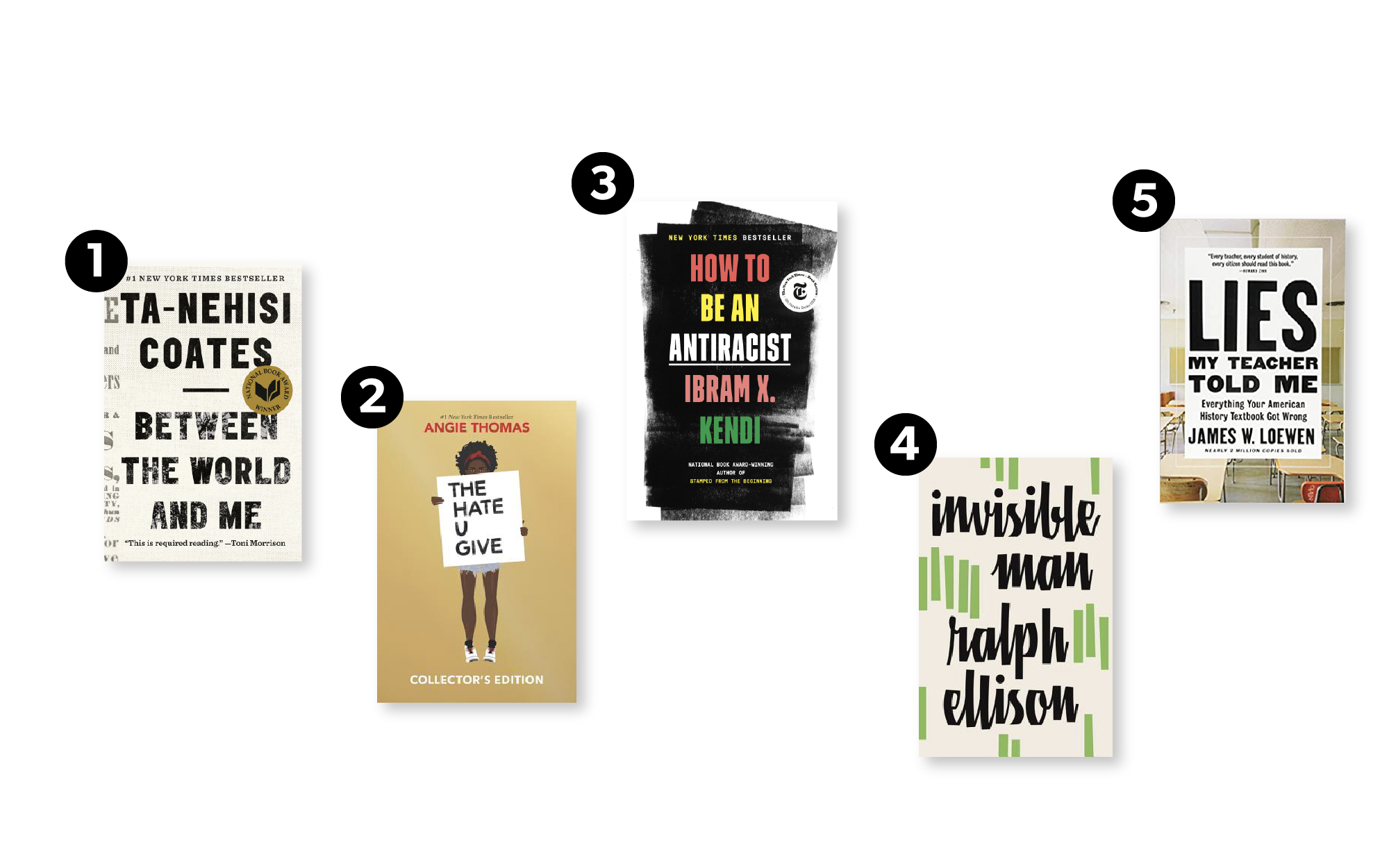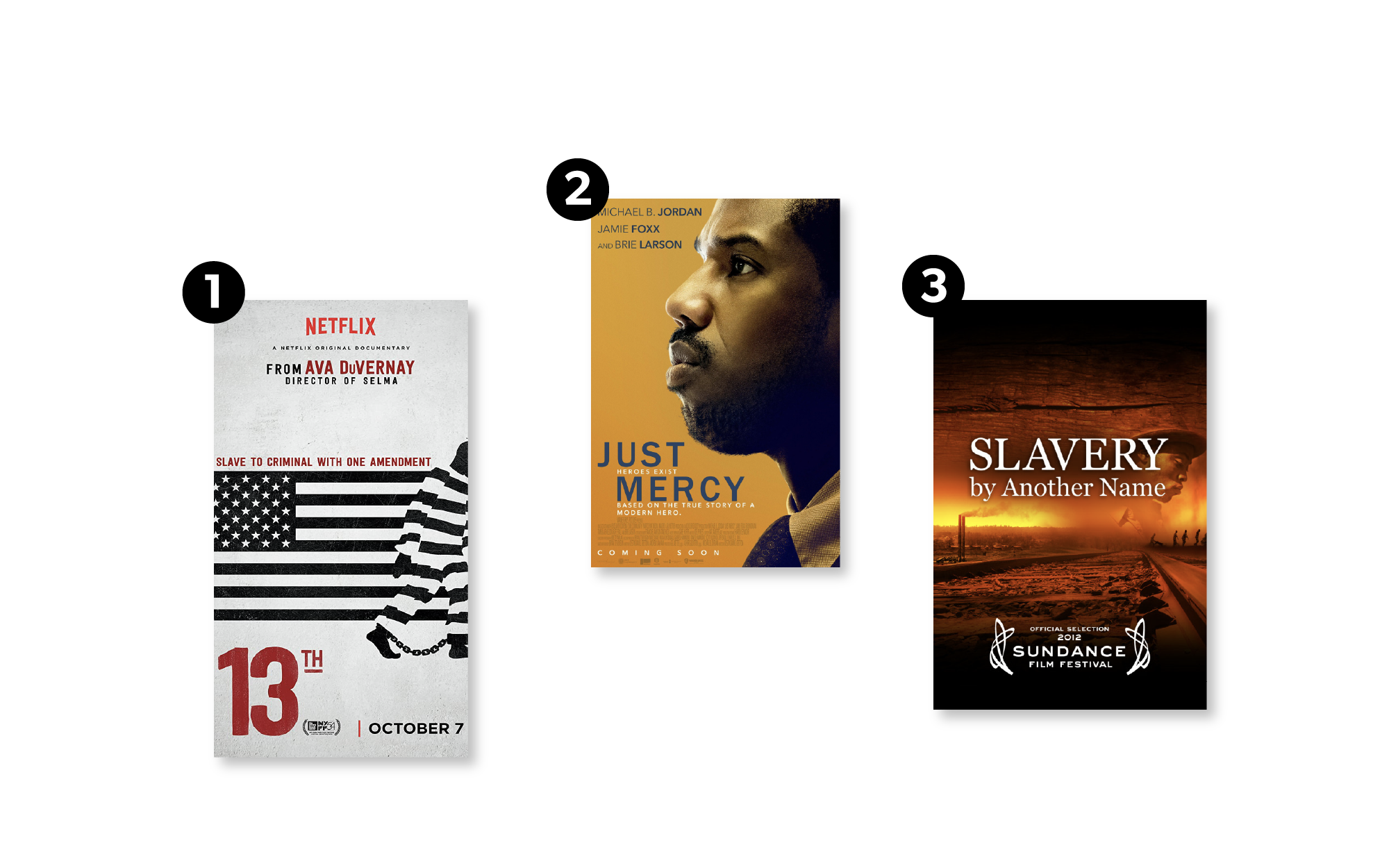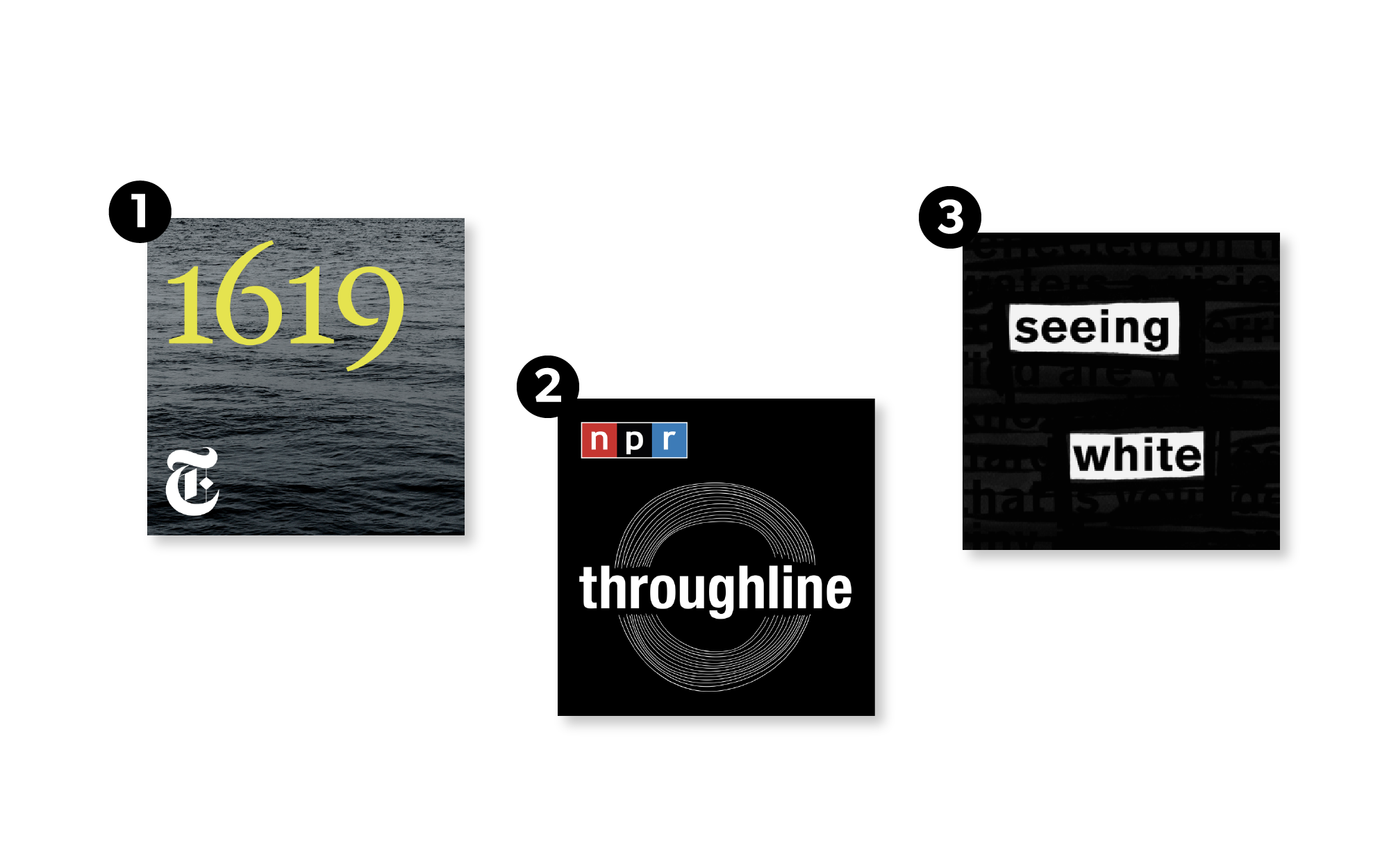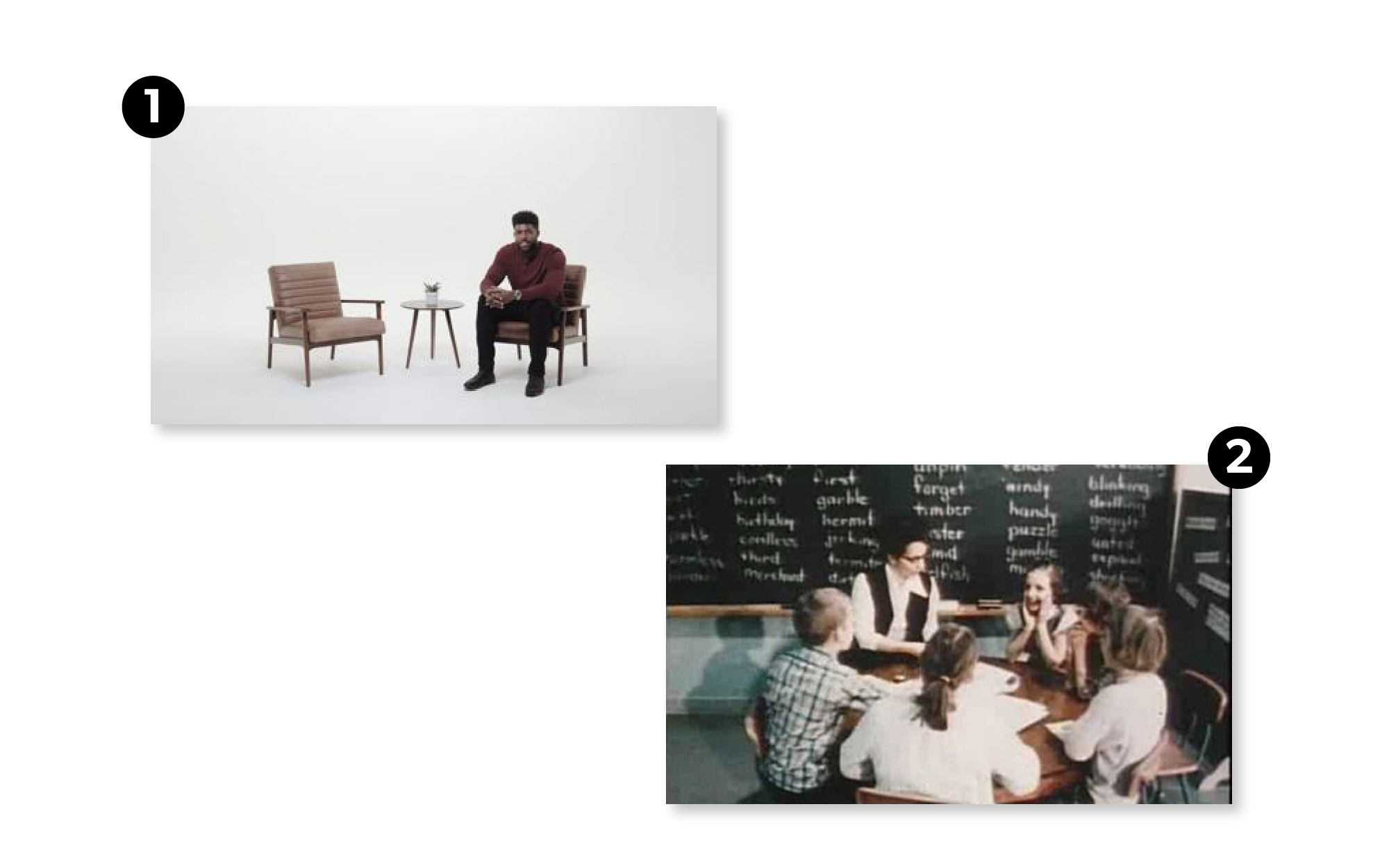CJ'ers Recommend: Books, Podcasts, Films, & More to Fight Racism
Jun 17, 2022
Written by
CJ
Juneteenth commemorates the end of slavery in the United States.
It wasn’t until two and a half years after Abraham Lincoln issued the Emancipation Proclamation on January 1, 1863, that Major General Gordon Granger landed at Galveston, Texas, with news that the war was over and the enslaved people there were now, also, free. 155 years later, June 19th represents a day to honor and celebrate Black history and Black lives.
In honor of Juneteenth, and as CJ continues to push towards a more diverse, equal, and inclusive culture both within our organization—and outside its walls—we pulled together a list of books, podcasts, documentaries, films, articles, courses, and more that were recommended by CJ associates.
Books

All book descriptions are originally found on Bookshop.org and the links below point there.
- Between the World and Me by Ta-Nehisi Coates
In a profound work that pivots from the biggest questions about American history and ideals to the most intimate concerns of a father for his son, Ta-Nehisi Coates offers a powerful new framework for understanding our nation's history and current crisis. #1 New York Times Best Seller – National Book Award Winner – Named one of Time’s Ten Best Nonfiction Books of the Decade – Pulitzer Prize Finalist – National Book Critics Circle Award Finalist. Hailed by Toni Morrison as "required reading," a bold and personal literary exploration of America's racial history by "the most important essayist in a generation and a writer who changed the national political conversation about race" (Rolling Stone) - The Hate U Give by Angie Thomas
Sixteen-year-old Starr Carter moves between two worlds: the poor neighborhood where she lives and the fancy suburban prep school she attends. The uneasy balance between these worlds is shattered when Starr witnesses the fatal shooting of her childhood best friend Khalil at the hands of a police officer. Khalil was unarmed. Goodreads Choice Awards Best of the Best ∙ William C. Morris Award Winner ∙ National Book Award Longlist ∙ Printz Honor Book ∙ Coretta Scott King Honor Book ∙ #1 New York Times Bestseller! - How to Be an Antiracist by Ibram X. Kendi
"The most courageous book to date on the problem of race in the Western mind." - The New York Times In How to Be an Antiracist, Kendi takes readers through a widening circle of antiracist ideas--from the most basic concepts to visionary possibilities—that will help readers see all forms of racism clearly, understand their poisonous consequences, and work to oppose them in our systems and in ourselves. - Invisible Man by Ralph Ellison
"Invisible Man" is a milestone in American literature, a book that has continued to engage readers since its appearance in 1952. The nameless narrator of the novel describes growing up in a black community in the South, attending a Negro college from which he is expelled, moving to New York and becoming the chief spokesman of the Harlem branch of "the Brotherhood, " and retreating amid violence and confusion to the basement lair of the Invisible Man he imagines himself to be. - Lies My Teacher Told Me: Everything Your American History Textbook Got Wrong by James W. Loewen
"Every teacher, every student of history, every citizen should read this book. It is both a refreshing antidote to what has passed for history in our educational system and a one-volume education in itself." - Howard Zinn - Black Rage by William H. Grier and Price M. Cobbs
The first book to examine the full range of black life from the vantage point of psychiatry, this widely acclaimed work has established itself as the classic statement of the desperation, conflicts, and anger of Black life in America today. - Capitalism and Slavery by Eric Williams
Slavery helped finance the Industrial Revolution in England. Plantation owners, shipbuilders, and merchants connected with the slave trade accumulated vast fortunes that established banks and heavy industry in Europe and expanded the reach of capitalism worldwide. Eric Williams advanced these powerful ideas in Capitalism and Slavery, published in 1944. - Germany's Black Holocaust by Firpo Carr
In an attempt to give the incidents their rightful recognition in the historical context of the Holocaust, Dr. Firpo W. Carr has authored a new book entitled, Germany's Black Holocaust: 1890-1945. In it, he reveals the startling hidden history of Black victims of the Holocaust. The mayhem and carnage date back to the turn of the 20th century, many years before there were ever any other unfortunate victims-Jew or Gentile-of the Holocaust. - Just Mercy: A Story of Justice and Redemption by Bryan Stevenson
A powerful true story about the potential for mercy to redeem us, and a clarion call to fix our broken system of justice--from one of the most brilliant and influential lawyers of our time. #1 New York Times Bestseller, now a major motion picture starring Michael B. Jordan and Jamie Foxx (see Movie section below). Named One of the Most Influential Books of the Decade by CNN. Named One of the Best Books of the Year by The New York Times - The Washington Post - The Boston Globe - The Seattle Times - Esquire - Time - Malcom X: A Life of Reinvention by Mannig Marable
Winner of the Pulitzer Prize for History, the definitive biography of Malcolm X. Hailed as "a masterpiece" (San Francisco Chronicle), the late Manning Marable's acclaimed biography of Malcolm X finally does justice to one of the most influential and controversial figures of twentieth-century American history. - Me and White Supremacy by Layla Saad
A New York Times and USA Today bestseller! This eye-opening book challenges you to do the essential work of unpacking your biases and helps white people take action and dismantle the privilege within themselves so that you can stop (often unconsciously) inflicting damage on people of color, and in turn, help other white people do better, too. - Mindful of Race: Transforming Racism from the Inside Out by Ruth King
Racism is a heart disease, writes Ruth King, and it's curable. Exploring a crucial topic seldom addressed in meditation instruction, this revered teacher takes to her pen to shine a compassionate, provocative, and practical light into a deeply neglected and world-changing domain profoundly relevant to all of us. - Native Son by Richard Wright
Set in Chicago in the 1930s, Richard Wright's powerful novel is an unsparing reflection on the poverty and feelings of hopelessness experienced by people in inner cities across the country and of what it means to be black in America. "If one had to identify the single most influential shaping force in modern Black literary history, one would probably have to point to Wright and the publication of Native Son." - Henry Louis Gates Jr. - The New Jim Crow: Mass Incarceration in the Age of Colorblindness by Michelle Alexander
Seldom does a book have the impact of Michelle Alexander's The New Jim Crow. Since it was first published in 2010, it has been cited in judicial decisions and has been adopted in campus-wide and community-wide reads; it helped inspire the creation of the Marshall Project and the new $100 million Art for Justice Fund; it has been the winner of numerous prizes, including the prestigious NAACP Image Award; and it has spent nearly 250 weeks on the New York Times bestseller list. - Race Matters by Cornell West
First published in 1993, on the one-year anniversary of the Los Angeles riots, Race Matters became a national bestseller that has gone on to sell more than half a million copies. This classic treatise on race contains Dr. West's most incisive essays on the issues relevant to black Americans, including the crisis in leadership in the Black community, Black conservatism, Black-Jewish relations, myths about Black sexuality, and the legacy of Malcolm X. The insights Dr. West brings to these complex problems remain relevant, provocative, creative, and compassionate. - Race Talk and the Conspiracy of Silence by Derald Wing Sue
If you believe that talking about race is impolite, or that "colorblindness" is the preferred approach, you must read this book. Race Talk and the Conspiracy of Silence debunks the most pervasive myths using evidence, easy-to-understand examples, and practical tools. - So You Want to Talk About Race by Ijeoma Oluo
In this New York Times bestseller, Ijeoma Oluo offers a hard-hitting but user-friendly examination of race in America. "Oluo gives us—both white people and people of color—that language to engage in clear, constructive, and confident dialogue with each other about how to deal with racial prejudices and biases." - National Book Review - They Came Before Columbus by Ivan Van Sertima
They Came Before Columbus reveals a compelling, dramatic, and superbly detailed documentation of the presence and legacy of Africans in ancient America. Examining navigation and shipbuilding; cultural analogies between Native Americans and Africans; the transportation of plants, animals, and textiles between the continents; and the diaries, journals, and oral accounts of the explorers themselves, Ivan Van Sertima builds a pyramid of evidence to support his claim of an African presence in the New World centuries before Columbus. - Understanding White Privilege by Frances Kendall
Understanding White Privilege delves into the complex interplay between race, power, and privilege in both organizations and private life. It offers an unflinching look at how ignorance can perpetuate privilege, and offers practical and thoughtful insights into how people of all races can work to break this cycle. - Uprooting Racism by Paul Kivel
Uprooting Racism offers a framework around neoliberalism and interpersonal, institutional, and cultural racism, along with stories of resistance and white solidarity. It provides practical tools and advice on how white people can work as allies for racial justice, engaging the reader through questions, exercises, and suggestions for action, and includes a wealth of information about specific cultural groups such as Muslims, people with mixed heritage, Native Americans, Jews, recent immigrants, Asian Americans, and Latino/as. - White Fragility: Why It’s So Hard for White People to Talk About Racism by Robin DiAngelo
The New York Times best-selling book exploring the counterproductive reactions white people have when their assumptions about race are challenged, and how these reactions maintain racial inequality. - Why Are All the Black Kids Sitting Together in the Cafeteria? And Other Conversations about Race by Dr. Beverly Daniel Tatum
Walk into any racially mixed high school and you will see Black, White, and Latino youth clustered in their own groups. Is this self-segregation a problem to address or a coping strategy? Beverly Daniel Tatum, a renowned authority on the psychology of racism, argues that straight talk about our racial identities is essential if we are serious about enabling communication across racial and ethnic divides. - Why I'm No Longer Talking to White People about Race by Reni Eddo-Lodge
Award-winning journalist Reni Eddo-Lodge was frustrated with the way that discussions of race and racism are so often led by those blind to it, by those willfully ignorant of its legacy. Her response, Why I'm No Longer Talking to White People About Race, has transformed the conversation both in Britain and around the world. - Witnessing Whiteness by Shelly Tochluk
Witnessing Whiteness invites readers to consider what it means to be white, describes and critiques strategies used to avoid race issues, and identifies the detrimental effect of avoiding race on cross-race collaborations. The author illustrates how racial discomfort leads white people toward poor relationships with people of color. - Various works and words by Dr. Henrik Clarke
John Henrik Clarke (January 1, 1915 - July 12, 1998) was an African-American historian, professor, and a pioneer in the creation of Pan-African and Africana studies, and professional institutions in academia starting in the late 1960s. - Various works and words by James Baldwin
James Arthur Baldwin (August 2, 1924 – December 1, 1987) was an African American novelist, playwright, essayist, poet, and activist.
Documentaries & Films

- 13th, available on Netflix, is an eye-opening documentary by award-winning filmmaker and director, Ava DuVernay. Scholars, activists, and politicians analyze the criminalization of African Americans and the US prison boom.
- Just Mercy, a film starring Michael B. Jordan and Jamie Foxx, is based on the life work of civil rights attorney Bryan Stevenson, founder of the Equal Rights Initiative. Currently available to stream for free across many platforms.
- PBS documentary, Slavery by Another Name, is based on the 2009 Pulitzer Prize-winning book by Douglas A. Blackmon that challenges one of our country’s most cherished assumptions: the belief that slavery ended with Abraham Lincoln’s Emancipation Proclamation of 1863.
- The Vice documentary series, Hate Thy Neighbor follows stand-up comedian, Jamali Maddix, as he explores what can be learned about racism from meeting people around the world who dedicate their lives to hate.
- Crime + Punishment examines the United States' most powerful police department through the brave endeavors of a group of active-duty officers and one unforgettable private investigator who risk their careers and safety to bring light to harmful policing practices which have plagued the precincts and streets of New York City for decades.
- Fruitvale Station - A fictional account of the last days of Oscar Grant III, an unarmed African-American who was killed by a transit police officer on a BART train platform early on New Year’s Day in 2009.
- Selma - A 2014 historical drama directed by Ava DuVernay, based on the 1965 Selma to Montgomery voting rights marches initiated and directed by James Bevel and led by Martin Luther King Jr., Hosea Williams, and John Lewis.
- Episode one, season one of the Netflix series, Explained, dives into “The Racial Wealth Gap”. This 16-minute episode follows Cory Booker and others as they discuss how slavery, housing discrimination, and centuries of inequality have compounded to create a racial wealth gap.
Podcasts

- 1619 is a New York Times audio series, hosted by Nikole Hannah-Jones, that examines the long shadow of American slavery.
- NPR Throughline - “American Police” examines the origins of American policing and how those origins put violent control of Black Americans at the heart of the system.
- Scene on Radio - Season 2: “Seeing White” - Host John Biewen and collaborator Chenjerai Kumanyika explore the history and meaning of whiteness.
Videos

- Former NFL Linebacker, Emmanuel Acho, launched the video series, Uncomfortable Conversations with a Black Man in order to educate and inform on racism, systemic racism, social injustice, rioting, and the hurt that Black Americans are feeling today. Conversations so far include Matthew McConaughey and Chip and Joanna Gaines and their kids.
- A Class Divided- A classic PBS Frontline episode from 1985. The day after Martin Luther King, Jr. was killed, Jane Elliott, a teacher in a small, all-white Iowa town, divided her third-grade class into blue-eyed and brown-eyed groups and gave them a daring lesson in discrimination. This is the story of that lesson, its lasting impact on the children, and its enduring power 30 years later.
- How Can We Win - David Jones Media interviews author, Kimberly Jones in this viral video. Here’s an article with links to additional videos.
- Racism has a cost for everyone is a 15-minute TED Talk with public policy expert, C. Heather McGhee, who shares how racism makes our economy worse—and not just in ways that harm people of color.
- The Massacre of Tulsa’s “Black Wall Street" - This ten-minute video from Vox dives into the Tulsa Massacre when white mobs destroyed "Black Wall Street" in 1921.
- YouTube lectures by Tim Wise, an anti-racist activist, essayist, and author of seven books on racism, inequality, and white privilege.
- 5 Tips for Being an Ally is a three-minute YouTube video by writer, actress, and vlogger, Franchesca Ramsey.
Instagram Accounts
- @rachel.cargle is a writer and activist who uses Instagram to guide conversations, encourage critical thinking, and nurture meaningful engagement with people all over the world.
- @kimberlylatricejones is a 2020 NAACP Image Award Nominee and Co-Author of the novel, I'm Not Dying With You Tonight.
- @theconsciouskid provides parenting and education through a critical race lens.
- @colorofchange is a progressive nonprofit civil rights advocacy organization that designs campaigns powerful enough to end practices that unfairly hold Black people back.
- @jessicawilson.msrd centers the experiences of those most marginalized in conversations about food and bodies.
Classes and Programs
- The Great Unlearn - Writer and activist, Rachel Cargle creates resources and critical discourse to aid in unlearning racism.
- Justice in June – A google doc guide with actionable steps that individuals can take to become better allies. Detailed plans for those willing to devote 10, 25, or 45 minutes a day.
- The University of Illinois at Urbana-Champaign is offering a free online course through Coursera: Race and Cultural Diversity in American Life and History, taught by James D. Anderson. Learners will deepen their understanding and appreciation of ways in which race, ethnicity, and cultural diversity have shaped American institutions, ideology, law, and social relationships from the colonial era to the present.
- 4A’s Workplace Enlightenment Certification Program - A certification program aimed at improving the access, representation, advancement, and workplace conditions for marginalized, underrepresented groups and providing cross-cultural and cross-identity education.
Organizations
- Black Lives Matter - A global organization in the US, UK, and Canada, whose mission is to eradicate white supremacy and build local power to intervene in violence inflicted on Black communities by the state and vigilantes.
- Campaign Zero - The comprehensive platform of research-based policy solutions to end police brutality in America.
- Color of Change - Designs campaigns powerful enough to end practices that unfairly hold Black people back, and champion solutions that move us all forward. Until justice is real.
- EJI – The Equal Justice Initiative works to end mass incarceration, excessive punishment, and racial inequality.
- MAIP - Multicultural Advertising Intern Program that exists to advocate for and connect diverse talent to the marketing industry.
- NAACP - the National Association for the Advancement of Colored People works to ensure the political, educational, social, and economic equality of rights in order to eliminate race-based discrimination and ensure the health and well-being of all persons.
- The T. Howard Foundation promotes diversity in media and entertainment by increasing the number of diverse and underrepresented groups and underserved communities within the industry.
Articles & Google Docs with Even MORE Resources
- A Detailed List of Anti-Racism Resources
- Anti-Racism Resources for White People
- Anti-Racism Resources
- Are You Prejudiced? Take the Implicit Association Test
- The Basic Guide to Why BLM is Needed
- The Cycle of Socialization by Bobbie Harro
- “The Doll Test” by Doctors Kenneth and Mamie Clark
- Letters for Black Lives
- This List Of Books, Films, And Podcasts About Racism Is A Start, Not A Panacea
- Obama.org: ANGUISH AND ACTION
- Obama.Org - New Era of Public Safety: An Advocacy Toolkit for Fair, Safe, and Effective Community Policing
- 25 Books for People Who Want to Learn More About Race in America
- NYT: An Antiracist Reading List
- 135 Racial Equity Resources for Education, Professional & Community Development, Health, and Civil Rights
This blog post was originally published on June 19, 2020, and was updated in 2021 to include images.
Up Next
Expand Your Brand’s Reach
Achieve sustained growth and reach your target audience. Work with world-class publishers and influencers to successfully promote brand products and services.
Partner with the World’s Best Brands
Earn seamlessly by partnering with the world’s most widely recognized brands, promoting products and services your audience enjoys. Engage with brands you know and love all in one place.
Share